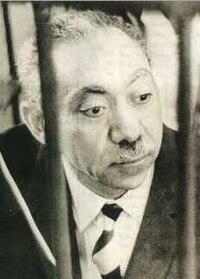Sayyid Qutb
Sayyid 'Ibrāhīm Ḥusayn Quṭb[Note 1] (/ˈkuːtəb/[1] or /ˈkʌtəb/; Egyptian Arabic pronunciation: [ˈsæjjed ˈʔotˤb], Arabic: [ˈsæjjɪd ˈqʊtˤb]; Arabic: سٌَيٍِّدُ قُّطْبٍُِ إِبْرَاهٌِيمٍَُ حًًُّسَيْٓنٍ Sayyid Quṭb; 9 October 1906 – 29 August 1966), known popularly as Sayyid Qutb (Arabic: سًًٍََِّّـيِّْدُ قٍُطٌٍْبٍ), was an Egyptian author, educator, Islamic scholar, theorist, revolutionary, poet, and a leading member of the Egyptian Muslim Brotherhood in the 1950s and 1960s.

In 1966, he was found guilty of planning the assassination of Egyptian President Gamal Abdel Nasser and was executed by hanging in Cairo at the age of 59.
He is called "the Father of Salafi jihadism. Many have also called him the father of al-Qaeda and ISIL since these groups were founded and inspired by his ideas.[2]
Notes
change- ↑ also spelled Said, Syed, Seyyid, Sayid, Sayed; Koteb, Qutub, Kotb, Kutb
References
change- ↑ "Qutb". Random House Webster's Unabridged Dictionary.
- ↑ Manne, Robert (7 November 2016). "Sayyid Qutb: Father of Salafi Jihadism, Forerunner of the Islamic State". ABC News. Archived from the original on 2 October 2018.